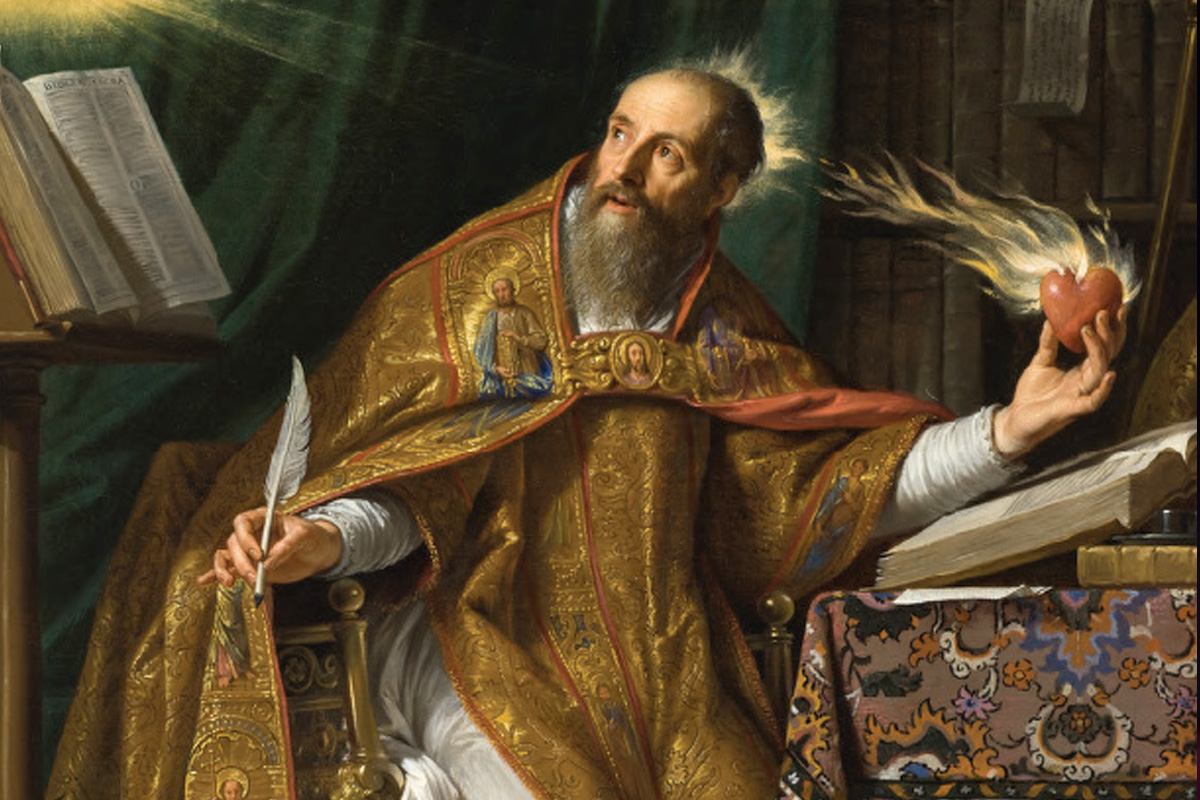St. Augustine is one of the greatest saints and theologians of the Catholic Church.Unsurpassed are the intensity and depth of his knowledge. He is unique in his greatness and grace and towers above all the other philosophers, writers and the saints of Christianity. The hearts and minds that are tormented by the stresses and tensions of modern life will find a congenial companion in him. Who can forget lines like, “Late I have I learned to love you, Beauty, at once so ancient and new” and “Our hearts are restless until they find rest in you” that have become words of great comfort and joy in the hearts of so many down through the centuries?
St. Augustine was born in 354 at Thagaste in North Africa. His parents were Patricius and Monica. His father was not a Christian but he converted to the Christian faith through the efforts and prayers of Monica. Augustine began his studies in rhetoric at Carthage in 370. His father died in 371. It was in 372 that a son was born to him through his relations with a woman that he took as his common law wife without marrying her. He left for Rome in 383 and established a school of rhetoric there. Later, he moved to Milan where he got a job as a Master of Rhetoric. It was there he came into contact with St. Ambrose, the Bishop of Milan. In Milan, he lived in the company of his friend Alypius and began reading the works of Plato and Plotinus.
One day as he was walking in his garden, tormented by the conflicting feelings of chastity and the memories of his past sinful life, he heard a child’s voice telling him: “Tolle et Lege, Tolle et lege” meaning “take up and read.” He returned to his room where he found Alypius reading the epistles of Paul and there he found a passage that riveted his attention: “Not in rioting and drunkenness; not in chambering and impurities; not in contention and envy; but put ye on the Lord, Jesus Christ, and make no provision for the flesh in its concupiscence.” This happened in 386 and he resolved then and there to resign his job and retire to a house along with his mother, brother, Navigius, son, Adeodatus and his friend, Alypius. St. Augustine was baptized by St. Ambrose in 387. He planned to return to Africa after his baptism. On the way, his mother passed away in Ostia.
His writings and teachings defended the faith against Manicheism, Donatism and Pelagianism. The Confessions was written in 397 and The City of God in 413. He passed away in 430 in his 76th year. It is said that he was reciting constantly the seven penitential psalms in the last days of his life and was crying inconsolably.
Major phases in his life:
The first religious crisis in his life happened in 373 under the influence of one of the writings of Cicero, Hortensius (45 B.C.) which is a call to people to renounce vices and devote themselves to the quest for truth.
Augustine, later, became attracted to a heretical Christian sect known as Manichaeism founded by one Mani of Persia which teaches the existence of two cosmic principles of good and evil in the world. His attraction to the sect was based more on the renunciation of sex practiced by some of the adherents of the sect. Later, his acquaintance with neo-Platonism after his arrival in Milan cured him from his attachment to Manichaean dualism. According to Neo-Platonism, evil has no power in itself-it is the absence of good.
His final break with Manichaeism happened when he decided to receive baptism in 387.
A semi-monastic community was established in his home town, Thagaste. During one of his visits to Hippo, he was forced to accept ordination to priesthood with the intention of making him the Bishop of Hippo. In 396, after the death of the then bishop, he was appointed the bishop of Hippo and frm that time onwards his attention was turned fully to the pastoral care of his people and to the defense of the doctrines of the faith. The Confessions which was written when he was the Bishop of Hippo is much more than a autobiography. He saw in his own story a model case of how God humbles and recovers the lost sheep.
The City of God was written to refute the allegation of the pagans that Rome was attacked and pillaged by the vandals in 410 because of the prohibition of cults to the pagan gods who were protecting Rome. In this work Augustine refutes this argument of the pagans and discusses the nature of Christian’s attitude towards state and society. It contrasts the history and destiny of the city of God and the earthly society.


